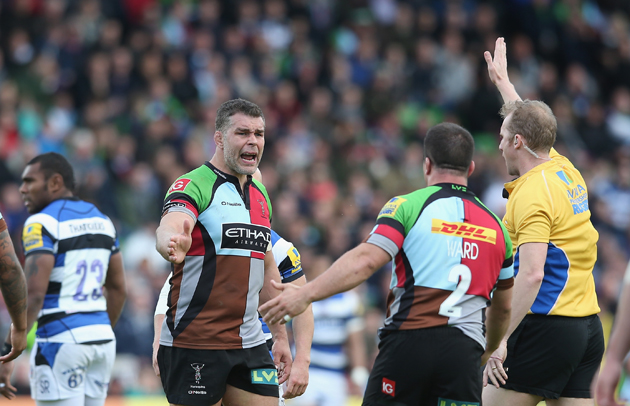The referees are treading an increasingly fine line between showing empathy for on-field 'self-policing' and having to kowtow to the sofa generation who can analyse every transgression in slow motion
As the second half of Harlequins’ thrilling win over Bath grew fractured and frantic on Saturday, BT Sport commentator Austin Healey indulged in a bit of a whine. Referee Wayne Barnes had asked for the opinion of his TMO, and the Leicester Lip was wound up.
“This is ridiculous,” he fumed, regarding a slow-motion replay of Nick Easter’s shirt-tug on Leroy Houston. “There will be no self-policing in rugby if this sort of thing carries on.”
Now it’s not at all surprising to hear a former scrum-half defend the concept of a player taking the law into their own hands. Number nines, especially influential ones, often get pinned down after firing away passes – it is one of the more annoying trends of today’s game.
Usually, the most effective way for a victim to discourage the practice is by aiming an elbow or knee at the offender as inconspicuously as possible. There are rarely complaints.
Even so, although Healey has spoken a lot of sense on officiating recently, in my opinion he was wrong this time. Firstly, Easter’s grab of Houston’s jersey was exactly the kind of act that a touch-judge or TMO should be called upon to penalise. Secondly, it had precisely zero to do with self-policing.
A fiery flash-point the previous evening at the Stade Ernest Wallon was more suitable ammunition for this debate. While Johnny Sexton was busy justifying his €55,000 per-month pay-cheque by dumping Toulouse out of the Top 14 play-offs – securing Racing Metro’s only away win over Guy Noves’ side in 111 years of trying – a bout of handbags broke out.
Following a brief discussion with his assistant (and being charged at by Racing’s Springbok lock Jaundre Kruger, who mimed a television screen about 17 times) Jerome Garces requested a big-screen replay.
What came to light was a fairly messy series of events. Bernard Le Roux dived through a ruck and grabbed hold of Toulouse’s replacement hooker Christopher Tolofua – no part of the breakdown – by the ankles. It was a blatant attempt to illegally remove a defender, which worked. A bigger issue was Tolofua’s reaction. On his way down, the 20 year-old cannonball was clearly incensed and kicked out at Le Roux, brushing the Racing openside’s scrum-cap with his studs.
Now Garces is not at all shy of brandishing red cards in big matches as Jared Payne and Stuart Hogg will testify. There would have been very few complaints if Tolofua had been dismissed this time, too. However, Garces instead beckoned both captains over and demanded they cool their players’ jets. Then he blew for a penalty against Le Roux.
Garces’ call implicitly advocated Tolofua’s old school (if slightly savage) actions. Some consternation surfaced on social media, but it was undoubtedly a decision that demonstrated respect for the frustration that subtle, cynical obstructions cause. Garces is not alone in understanding those values.
Steve Walsh has made two very similar interventions in the early rounds of the current Super 15 campaign. Back in March during the Crusader’s turgid 14-13 defeat of the Stormers, Owen Franks held Schalk Burger back as the firebrand flanker attempted to lead his team’s defensive line inside their own 22. A re-run showed big Schalk try to free himself by throwing a couple of haymakers at Franks, and the Christchurch crowd gasped. Walsh was unperturbed. He calmly summoned Franks and explained why the Stormers would be getting a penalty.
Five weeks later, Walsh oversaw a spiteful derby between the Reds and the Brumbies at Suncorp Stadium. While the hosts bombarded their opponents’ line, Eddie Quirk impeded Stephen Moore, who was standing in the guard position. Brumbies’ pitbull hooker swung a left hook into Quirk’s ribs, crumpling the Queensland flanker like a Coke can.
Will Genia sniped over to score, but Walsh wanted to review the incident. A view or five from there, the try was disallowed and Quirk penalised. Again, an act of violence was overlooked in favour of an earlier foul. Again Walsh actually displayed admirable empathy for the contest.
All three of these incidences drew vehement criticism, defining where officials stand in this era of TMO overkill – between a boulder and a hard place. They are damned by all-seeing sofa experts if they allow rough justice and embrace self-policing (where do your draw the line on what degree of retaliation is allowed anyway?) and damned by prickly traditionalists if they go the other way.
One thing is for sure; television viewers will not be weaned off the ample diet of accessibility they have now. Even with a potential reduction in TMO activity next season, the difficulty of a referee’s job in the professional game is on a very steep curve heading upward. Pundits like Healey have a duty to keep reminding the public of that.








